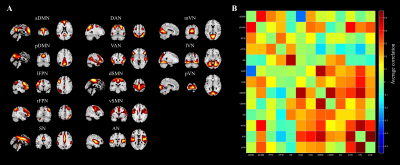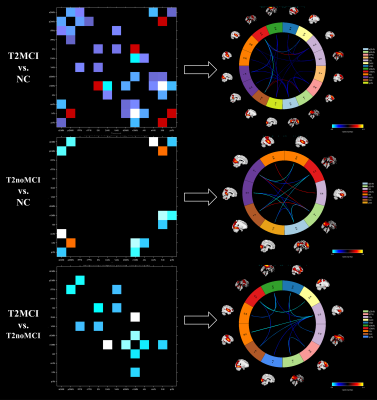2477
Large-Scale Functional Network Connectivity Mediates the Associations of Serum Lipids and Cognitive Function in Patients with Type 2 Diabetes
Wen Zhang1, Jilei Zhang2, and Bing Zhang1
1Drum Tower Hospital, The Affiliated Hospital of Nanjing University Medical School, Nanjing, China, 2Philips Healthcare, Shanghai, China, Shanghai, China
1Drum Tower Hospital, The Affiliated Hospital of Nanjing University Medical School, Nanjing, China, 2Philips Healthcare, Shanghai, China, Shanghai, China
Synopsis
Patients with type 2 diabetes mellitus (T2DM) often have pathologically altered lipid metabolism. Evidence has confirmed that dyslipidemia is linked to cognitive decline. We explored the large-scale functional network connectivity alterations and their potential relationships with serum lipids and cognitive performance in T2DM patients. Our results suggested lower inter and intra-network functional connectivity in T2DM patients and the possibility of improving cognitive function through lipids management.
Introduction
Patients with type 2 diabetes mellitus (T2DM) often have pathologically altered lipid metabolism1. A large of cross-sectional and longitudinal studies have confirmed that serum lipid profile is linked to several aspects of human cognition2,3. However, the brain is a complex system consisting of several functional networks, so far, little is known about the relationships between lipid metabolism and inter and intra-network functional connectivity. Our objective was to assess the serum lipids, cognitive performance, and intra and inter-network functional connectivity (FC) in T2DM patientsMethods
A total of 147 age, sex and education matched participants were included, divided into T2DM patients with mild cognitive impairment (T2MCI) (n=40), T2DM patients without mild cognitive impairment (T2noMCI) (n=62) and 45 normal control subjects. Each participant underwent resting-state functional MRI scans, cognitive and peripheral blood biochemistry assessments. Large-scale inter and intra- network FCs were calculated using independent component analysis. Multivariate analysis of covariance, partial correlation, and mediation analyses was conducted to test for potential associations between lipid metabolism, inter and intra-network FC, and cognitive performance.Results
Compared with control subjects, the inter and intra-network FC were reduced in either T2MCI or T2noMCI patients. We found significant differences in inter-network FC among the three groups after adjusted age, sex, education and head motion parameters: between ventral attention and medial visual networks, between left frontoparietal and posterior visual networks. In patients with T2DM, lower inter-network FCs were correlated with higher serum total cholesterol, high-density lipoprotein cholesterol, and low-density lipoprotein cholesterol, while correlated with worse cognitive performance. Voxel-wise intra-network FC analyses demonstrated significant group differences in the left posterior cingulate gyrus of the anterior default mode network, right middle occipital gyrus of the dorsal attention network, and right superior parietal lobe of the lateral visual network. Each of these intra-network FC alterations was positively correlated with MoCA scores in patients with T2DM. More importantly, the relationship between lipid metabolism scores and cognitive scores was mediated by the inter-network FC scores.Conclusion
Our current study expands existing knowledge in type 2 diabetes regarding lipid metabolism-brain-cognition relations from the perspective of large-scale functional network organization. Our results suggested the possibility of improving cognitive function through regulating serum lipids in diabetic patients.Acknowledgements
NoneReferences
- Giacca A., Xiao C., Oprescu A. I., Carpentier A. C., Lewis G. F. Lipid-induced pancreatic beta-cell dysfunction: focus on in vivo studies. American Journal of Physiology. Endocrinology and Metabolism. 2011;300(2):E255–E262.
- Stough C, Pipingas A, Camfield D, Nolidin K, Savage K, Deleuil S, Scholey A. Increases in total cholesterol and low density lipoprotein associated with decreased cognitive performance in healthy elderly adults. Metab Brain Dis. 2019 Apr;34(2):477-484.
- Reynolds CA, Gatz M, Prince JA, Berg S, Pedersen NL. Serum lipid levels and cognitive change in late life. J Am Geriatr Soc. 2010 Mar;58(3):501-9.
DOI: https://doi.org/10.58530/2022/2477

